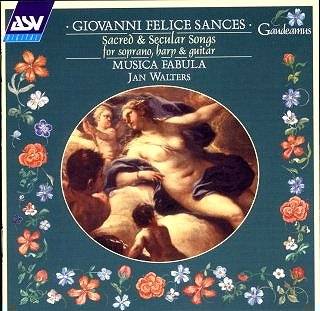Giovanni Felice SANCES
Sacred and Secular Songs for Soprano, Harp and Guitar
 Musica Fablua, directed by
Jan Walters
Musica Fablua, directed by
Jan Walters
 ASV (Gaudeamus) CD GAU
193 * [64:15]
ASV (Gaudeamus) CD GAU
193 * [64:15]

This is the third release by Musica Fabula of music written by the little-known
late Renaissance Man Giovanni Felice Sances. Sances lived an extraordinarily
long life for the time, from 1600 to1679, and was a singer, teacher and composer.
When he was nine his voice secured his place at the Collegio Germanico, a
German Jesuit college in Rome. As a young man he moved on to the more progressive
musical world of Venice, in 1636 became a singer in the court chapel in Vienna,
eventually rising to become Imperial Kappelmeister. Sances published many
collections of music both sacred and secular, although the music he wrote
after becoming Vice-Kappelmeister in 1649 was unpublished due to the Imperial
habit of ensuring the exclusivity of court works.
This disc draws upon music published from 1633 onwards. If Sances published
anything before this date it is currently unknown, though given that Jan
Walters researches parts of Musica Fabula's repertoire from the works of
obscure composers collected in European archives, there is perhaps more to
be discovered. Musica Fabula was formed by the harpist Walters (who on this
release plays the baroque triple harp) with soprano Sarah Pillow in 1992,
and the ensemble also features Liliana Mazzarri, soprano and Steven Player,
baroque guitar.
There are four sacred songs, nine secular, and for anyone listening in Italian,
or reading the libretto, the intermingling may seem a little strange. However,
despite some generally superior texts, translated by the Reverend David
Brecknell, Patrizia Litrico and Walters herself, the programme is probably
best enjoyed as a purely musical experience, concentrating on the beautiful
qualities of the voice as instrument. That said, the quality of yearning
within the secular songs at times borders on a spiritual intensity, with
a greater depth of human feeling and psychological realism, within beguiling
poetic clothes, than one might presume.
The songs appear in every combination, single voice with harp or guitar,
duet with harp or guitar, with both instruments, or in full ensemble. Not
only is the music itself varied and very beautiful indeed, with a serene,
placid yet paradoxically most alive quality which is absolutely captivating,
but the soloists are each individually very fine and combine into a perfectly
matched ensemble. The clear, strong tones of Sarah Pillow alternate or entwine
to gorgeous effect with the more 'coloured', intense singing of the Venezuelan
soprano Liliana Mazzarri.
In addition to music by Sances, the disc features instrumental interludes.
A guitar suite by Angelo Michele Bartolotti, (1615-1682) is placed near to
the midway point of the disc, and has a direct natural elegance which is
a hallmark of the concert. The other two instrumentals are harp pieces played
by Walters, a brief passacaglia by Luigi Rossi (1597-1653) and the most striking
of the three works, Ricercar Sopra Il Canto Fermo di Costantio Festa e
per Sonar All' Arpa by Ascanio Mayone (1565-1627).
It is very difficult to pick particular highlights, though if pressed Hor
che Chiarissme, on which Sarah Pillow is accompanied by both instrumentalists
is an especially enchanting love song, balanced against Fuggi Fuggi Il
Mio Cor, sung by Liliana Mazzarri. The final improvisation/passacaglia
is also exceptional, and shows a freedom and fantasy more usually found in
jazz and folk music, and perhaps also an explanation of why this album is
so wonderfully alive. Sarah Pillow is also a jazz singer, leads workshops
exploring the connections between early music and jazz, and Musica Fabula
go so far as to give early music / jazz 'crossover' concerts. It is surely
this jazz sensibility, with the recognition of music as something living,
breathing, relevant and ever changing, which enables Musica Fabula to make
the songs of Giovanni Felice Sances seem so vital over 350 years after they
were first performed. At times early music performance seems to embalm the
music, as if great age alone meant it had to be treated with special care
or else it would crumble in the hand - though fortunately this over reverence
is becoming less common - but Musica Fabula approach Sance's music on equal
terms, as something very much worthwhile of our consideration now. He was
a working musician, and so are they, and we should be very grateful for their
enthusiastic hard work which brings the Roman composer's world very much
back to life. A splendid release in every respect.
Reviewer
Gary S. Dalkin


![]()